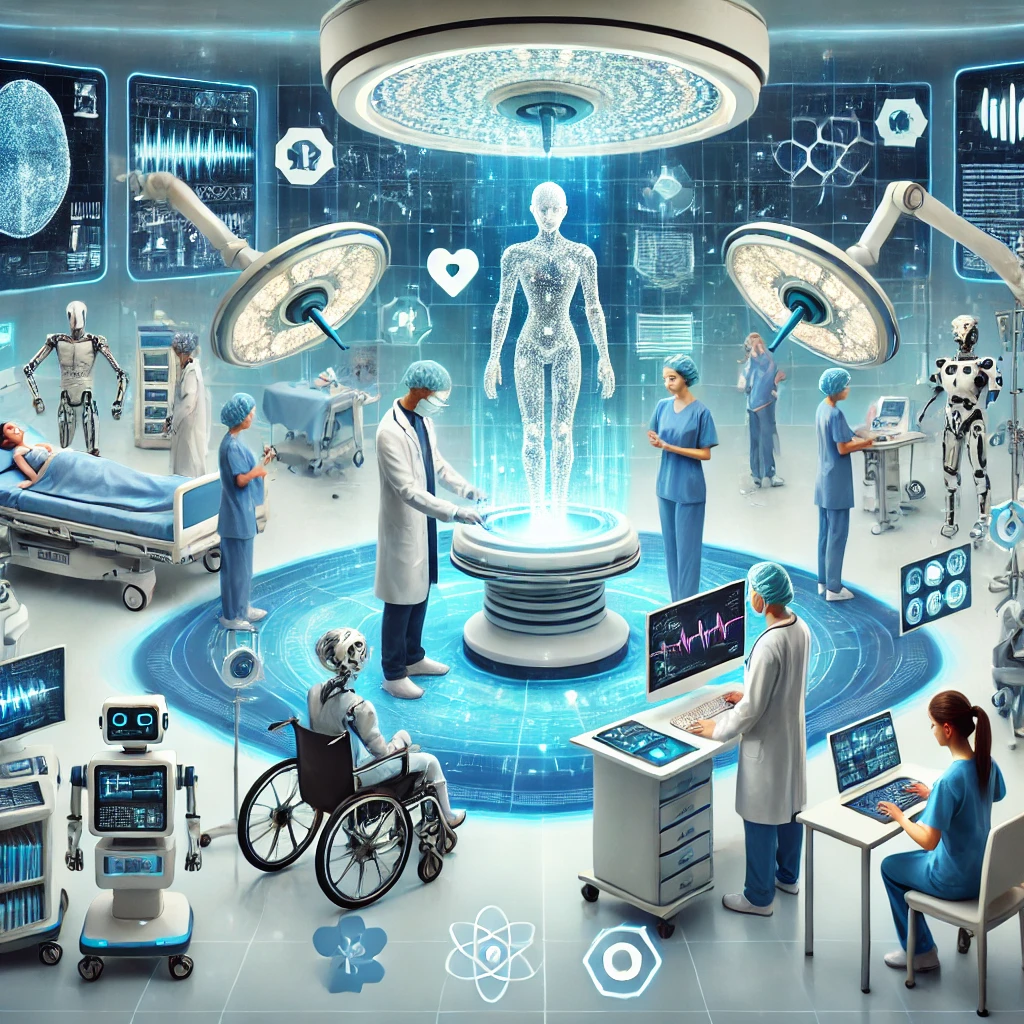Artificial Intelligence has emerged as a powerful force, impacting how we approach medical care. From early disease detection and personalized treatment plans to efficient resource allocation and streamlined administrative processes, AI is poised to transform the healthcare ecosystem in ways we never imagined.
In this article, we will explore the numerous advantages of AI in healthcare, shedding light on its game-changing potential and the profound impact it can have on improving patient outcomes, enhancing healthcare accessibility, and driving innovation in medical research.
The role of AI in improving patient care
AI plays a vital role in improving patient care by enhancing various aspects of healthcare. Here’s how AI contributes to better patient care:
- Early Detection and Accurate Diagnosis:
AI-powered diagnostic tools can analyze medical data and images with high accuracy, enabling early detection of diseases and conditions. This early detection can lead to timely interventions and improved patient outcomes.
- Personalized Treatment Plans:
By analyzing a patient’s medical history, genetic data, and other relevant factors, AI can help develop personalized treatment plans tailored to individual needs, increasing the effectiveness of therapies and reducing the risk of adverse reactions.
- Remote Patient Monitoring:
AI-enabled wearable devices and remote monitoring systems can track patient vital signs, symptoms, and adherence to treatment plans, allowing healthcare providers to monitor patients in real-time and intervene when necessary.
- Clinical Decision Support:
AI-powered decision support systems can assist healthcare professionals by providing data-driven recommendations, reducing the risk of human error, and ensuring consistent adherence to best practices.
- Improved Patient Experience:
AI-powered virtual assistants and chatbots can provide personalized healthcare information, answer common questions, and guide patients through the healthcare system, improving the patient’s experience.
- Efficient Resource Allocation:
By optimizing the allocation of healthcare resources, AI can contribute to better patient care by ensuring that the right resources are available when and where they are needed.
Ethical considerations and challenges of AI in healthcare
While AI holds immense promise for transforming healthcare, it also raises ethical considerations and challenges that must be addressed:
- Data Privacy and Security:
The use of AI in healthcare involves the processing of sensitive patient data, raising concerns about data privacy and security. Patient information must be protected and regulations must be followed to ensure compliance.
- Bias and Fairness:
AI algorithms can perpetuate biases present in the training data, leading to unfair or discriminatory outcomes. Addressing bias and ensuring fairness in AI systems is crucial for equitable healthcare delivery.
- Transparency and Explainability:
AI systems, particularly those based on deep learning, can be opaque and difficult to interpret, raising concerns about transparency and the ability to explain decisions made by these systems.
- Human-AI Collaboration:
While AI can assist healthcare professionals, it is essential to strike the right balance between human expertise and AI-driven decision-making, ensuring that healthcare remains a human-centric endeavor.
- Regulatory and Legal Challenges:
The development of AI in healthcare poses challenges for regulatory bodies and legal frameworks, which must adapt to ensure the safe and ethical deployment of AI technologies in healthcare settings.
- Workforce Implications:
The introduction of AI in healthcare may have implications for the healthcare workforce, requiring reskilling and adaptation to new roles and responsibilities.
Pros and cons of AI in healthcare
Like any transformative technology, AI in healthcare comes with both pros and cons. Here’s a balanced look at the advantages and potential drawbacks:
Pros:
- Improved diagnostics and early disease detection
- Personalized treatment plans tailored to individual needs
- Enhanced efficiency and resource optimization
- Accelerated drug discovery and development
- Remote patient monitoring and improved accessibility
- Reduced human error and consistent adherence to best practices
- Improved patient experience and engagement
Cons:
- Data privacy and security concerns
- Potential biases and unfair outcomes
- Lack of transparency and explainability in AI systems
- Challenges in human-AI collaboration and trust
- Regulatory and legal challenges
- Workforce implications and the need for reskilling
The future of AI in healthcare
The future of AI in healthcare is brimming with possibilities and exciting developments. As AI technologies continue to evolve and mature, we can expect to see:
- Increased Integration of AI in Healthcare Systems:
AI will become an integral part of healthcare systems, seamlessly integrated into various processes, from diagnostics and treatment planning to resource allocation and administrative tasks.
- Advancements in Precision Medicine:
AI will play a crucial role in the development of precision medicine, enabling personalized treatment plans based on an individual’s genetic makeup, lifestyle, and environmental factors.
- AI-Powered Robotic Surgery:
Robotic surgery systems powered by AI will become more advanced, offering enhanced precision, dexterity, and control, leading to improved patient outcomes and reduced recovery times.
- AI in Mental Health:
AI will be increasingly used in mental health care, providing personalized support, early intervention, and monitoring for conditions such as depression, anxiety, and addiction.
- AI-Driven Drug Discovery and Development:
AI will continue to accelerate the drug discovery and development process, identifying potential drug candidates, predicting their efficacy and safety profiles, and optimizing clinical trials.
- AI-Enabled Telemedicine and Remote Care:
AI-powered telemedicine and remote care solutions will become more prevalent, improving healthcare accessibility and enabling real-time monitoring and intervention, particularly in underserved areas.
Conclusion: Embracing the power of AI in healthcare
By leveraging the capabilities of AI, we can revolutionize the way we approach medical care, from early disease detection and personalized treatment plans to efficient resource allocation and streamlined administrative processes.
While the integration of AI in healthcare presents challenges and ethical considerations, addressing these concerns through responsible development, robust governance, and stakeholder engagement is crucial for realizing the full potential of AI in this domain.
As we move forward, it is essential to balance the benefits of AI and the ethical considerations, ensuring that AI in healthcare remains a human-centric endeavor, augmenting and supporting the expertise of healthcare professionals while prioritizing patient safety, privacy, and equitable access to care.


